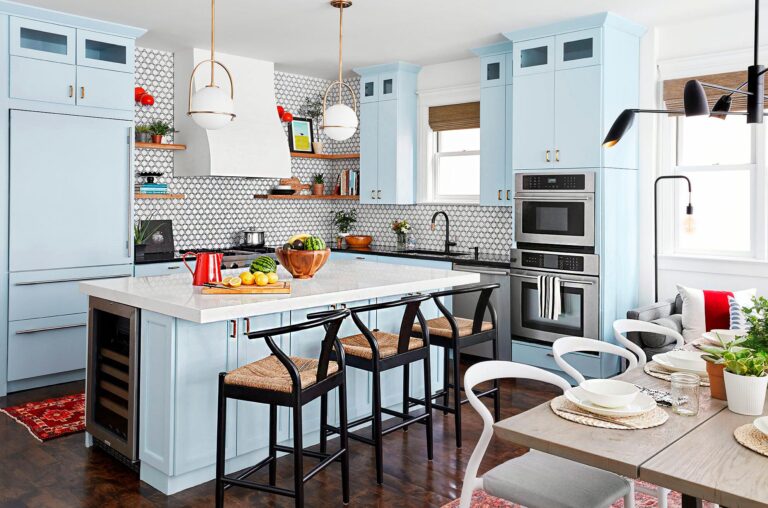A kitchen renovation can improve how you cook, entertain, and live. However, without proper planning, it can quickly turn chaotic. Careful budgeting, layout design, and scheduling help reduce stress and keep the process organized. A clear plan ensures your project stays on time and within cost, while delivering the look and functionality you want.
1. Set a Realistic Budget
Start by defining how much you can spend. Break down your budget into categories such as cabinetry, countertops, flooring, lighting, and labor. Always keep an extra 10% for unexpected expenses. A realistic budget helps you make smart choices and prevents financial strain later.
2. Assess Your Needs and Lifestyle
Before choosing materials or colors, think about how you use your kitchen. Do you cook often? Need more storage? Or want space for family gatherings? Your renovation should match your daily habits. Prioritize functionality over design trends. A well-planned layout improves workflow and makes cooking more enjoyable.
3. Choose a Functional Layout
The layout defines how comfortable your kitchen will be. Follow the work triangle rule, which connects the sink, stove, and refrigerator efficiently. For small kitchens, consider a galley or L-shaped design. Larger spaces work well with island or U-shaped layouts. Proper placement of appliances and cabinets saves time and effort.
4. Select Durable Materials
Pick materials that balance appearance and longevity. Quartz and granite countertops resist scratches and stains, while solid wood cabinets offer durability. Choose flooring like tile or vinyl for easy cleaning and water resistance. Good materials reduce maintenance and keep your kitchen looking new for years.
5. Plan Lighting Carefully
Lighting affects both design and functionality. Combine task, ambient, and accent lighting for the best results. Install under-cabinet lights to brighten workspaces and pendant lights above islands for visual appeal. Proper lighting prevents shadows and improves safety when cooking.
6. Choose Appliances Wisely
Invest in energy-efficient appliances to save on electricity bills. Stainless steel remains popular for its modern look and easy maintenance. Before buying, measure available space to ensure everything fits properly. Choose reliable brands with good service support to avoid breakdowns later.
7. Hire Trusted Professionals
Even if you plan to handle some work yourself, professional help ensures quality. Hire experienced contractors for electrical, plumbing, and installation work. Check reviews, compare quotes, and verify licenses. Clear communication with your team avoids mistakes and delays.
If you are passionate about renovation, design, or DIY projects, you can share your ideas through Write For Us Home Improvement opportunities. It’s a great way to connect with readers and contribute practical advice based on your own experiences.
8. Create a Detailed Timeline
A renovation timeline helps you stay on track. List each stage, including demolition, plumbing, electrical work, cabinetry, and final finishes. Allow buffer days for potential delays like weather or late deliveries. Following a schedule reduces stress and helps everyone stay accountable.
9. Prepare for Temporary Disruption
During renovation, your kitchen may be unusable for a while. Set up a temporary cooking area with a microwave, coffee maker, and small refrigerator. Plan simple meals and use disposable dishes to save time. Inform your family about the renovation schedule to avoid inconvenience.
10. Focus on Storage Solutions
Smart storage keeps your kitchen organized and clutter-free. Use pull-out drawers, corner units, and vertical racks to maximize space. Adding a pantry cabinet or built-in shelving increases efficiency. Functional storage ensures everything has its place, making your kitchen easier to maintain.
11. Stick to Your Design Plan
Avoid frequent changes once the work begins. Modifications during construction lead to delays and higher costs. Make all major decisions, including colors, fixtures, and layouts, before starting. Sticking to the plan ensures a smoother renovation experience.
12. Inspect Work Regularly
Check progress daily or at least a few times per week. Inspect for alignment issues, quality of materials, and installation accuracy. Catching mistakes early saves time and prevents rework. Maintain open communication with contractors to address concerns immediately. According to Home Creatives, consistent inspection during renovation ensures quality control, minimizes costly errors, and helps complete the project on schedule.
13. Manage Waste and Clean-Up
Renovations create dust and debris. Ask your contractor about waste disposal before the project starts. Keep doors closed to limit dust spread and use plastic covers to protect furniture. A clean workspace ensures safety and faster completion.
14. Add Final Touches
Once the major work is complete, focus on finishing details. Add backsplash tiles, install cabinet handles, and decorate with plants or artwork. These small touches personalize your kitchen and complete the look.
15. Review and Maintain
After completion, walk through your new kitchen with the contractor. Check plumbing, lighting, and finishes to confirm everything works properly. Keep warranties, receipts, and manuals for future maintenance. Regular upkeep helps preserve the quality of your renovation.
Final Thought
Planning a kitchen renovation takes patience and organization. By setting a clear budget, hiring the right professionals, and staying consistent with your plan, you can achieve a smooth and stress-free transformation. Careful preparation ensures that your new kitchen remains beautiful, functional, and durable for years to come.
